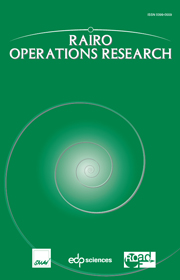Crossref Citations
This article has been cited by the following publications. This list is generated based on data provided by
Crossref.
Ageev, Alexander
and
Ivanov, Mikhail
2016.
Discrete Optimization and Operations Research.
Vol. 9869,
Issue. ,
p.
259.
Espinouse, Marie-Laure
Pawlak, Grzegorz
and
Sterna, Malgorzata
2017.
Complexity of Scheduling Problem in Single-Machine Flexible Manufacturing System with Cyclic Transportation and Unlimited Buffers.
Journal of Optimization Theory and Applications,
Vol. 173,
Issue. 3,
p.
1042.
Khatami, Mostafa
Salehipour, Amir
and
Cheng, T.C.E.
2018.
Coupled Task Scheduling With Exact Delays: Literature Review and Models.
SSRN Electronic Journal ,
Hesran, Corentin Le
Ladier, Anne-Laure
Botta-Genoulaz, Valérie
and
Laforest, Valérie
2018.
Reducing waste in manufacturing operations: a mixed integer linear program for bi-objective scheduling on a single-machine with coupled-tasks.
IFAC-PapersOnLine,
Vol. 51,
Issue. 11,
p.
1695.
Ageev, Alexander
2018.
Optimization Problems and Their Applications.
Vol. 871,
Issue. ,
p.
45.
Jang, Dae-Sung
and
Choi, Han-Lim
2019.
Interleaved Radar Pulse Scheduling for Multitarget Tracking With Multiple Simultaneous Receive Beams.
IEEE Transactions on Aerospace and Electronic Systems,
Vol. 55,
Issue. 3,
p.
1301.
Meziani, Nadjat
Oulamara, Ammar
and
Boudhar, Mourad
2019.
Two-machine flowshop scheduling problem with coupled-operations.
Annals of Operations Research,
Vol. 275,
Issue. 2,
p.
511.
Bessy, S.
and
Giroudeau, R.
2019.
Parameterized complexity of a coupled-task scheduling problem.
Journal of Scheduling,
Vol. 22,
Issue. 3,
p.
305.
Le Hesran, Corentin
Ladier, Anne-Laure
Botta-Genoulaz, Valérie
and
Laforest, Valérie
2020.
A methodology for the identification of waste-minimizing scheduling problems.
Journal of Cleaner Production,
Vol. 246,
Issue. ,
p.
119023.
Khatami, Mostafa
Salehipour, Amir
and
Cheng, T.C.E.
2020.
Coupled task scheduling with exact delays: Literature review and models.
European Journal of Operational Research,
Vol. 282,
Issue. 1,
p.
19.
Wojciechowicz, Wojciech
and
Gabay, Michaël
2020.
Scheduling High Multiplicity Coupled Tasks.
Foundations of Computing and Decision Sciences,
Vol. 45,
Issue. 1,
p.
47.
Le Hesran, Corentin
Agarwal, Aayush
Ladier, Anne-Laure
Botta-Genoulaz, Valérie
and
Laforest, Valérie
2020.
Reducing waste in manufacturing operations: bi-objective scheduling on a single-machine with coupled-tasks.
International Journal of Production Research,
Vol. 58,
Issue. 23,
p.
7130.
Ageev, Alexander
and
Ivanov, Mikhail
2020.
Mathematical Optimization Theory and Operations Research.
Vol. 12095,
Issue. ,
p.
265.
Chen, Bo
and
Zhang, Xiandong
2021.
Scheduling coupled tasks with exact delays for minimum total job completion time.
Journal of Scheduling,
Vol. 24,
Issue. 2,
p.
209.
Le Hesran, Corentin
Ladier, Anne-Laure
and
Botta-Genoulaz, Valérie
2021.
Advances in Production Management Systems. Artificial Intelligence for Sustainable and Resilient Production Systems.
Vol. 630,
Issue. ,
p.
399.
Hadda, Hatem
and
Abdessalem, Mhamed
2023.
New characterizations for the identical coupled tasks scheduling problem.
RAIRO - Operations Research,
Vol. 57,
Issue. 2,
p.
325.

